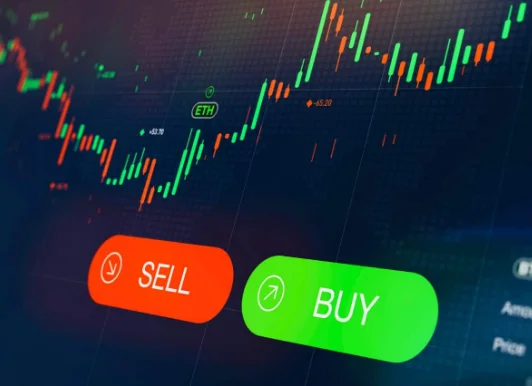Compared to investing, which uses a buy-and-hold approach, trading involves active engagement in the financial markets. The ability of a trader to be profitable over the long term is a prerequisite for trading success.Anyone who participates in the buying and selling of financial assets on any financial market is a trader. He or she has the option to buy or sell on their own behalf or on behalf of another person or organisation. The length of time that an investor or trader hangs onto an asset is the main distinction between them.A trader is a person who buys and sells equity on the short-term for an institution or for their own benefit. The costs of paying brokers in the form of various commission rates and capital gains taxes, which are applicable to trades, are two drawbacks of trading.
It’s possible that you’ve heard of stocks, shares, and funds. However, there are a huge number of financial marketplaces that you can trade as well as a wide range of trading items.
You can gain exposure to a variety of markets, including the S&P 500 and the FTSE 100, as well as to commodities like lean hog and cattle as well as major world currencies like the US dollar and the Japanese yen.

How does Trading Work?
1.When trading, you make money if the market price of your position moves in the right direction, and you lose money if it moves the other way.
2.Supply and demand is the fundamental concept to keep in mind. Demand increases and prices rise when there are more buyers than sellers in the market.
3.In a market when there are more vendors than customers, demand declines and prices decline.
4.Only directly on an exchange or over the counter (OTC) may one obtain exposure to assets.
5.When trading over the counter, the price at which an asset will be bought and sold must be agreed upon by the trader and the broker. An exchange, on the other hand, is a highly organised market where you can
For instance, you can trade listed futures or options on a market like the Intercontinental Exchange (ICE) or invest in UK shares on the London Stock Exchange (LSE).
You’ll see that most UK retail traders utilise derivatives like spread bets and CFDs to trade OTC since these assets are more readily available than those registered on a centralised exchange.
Retail investors, however, will utilise a stockbroker to execute investments through a stock exchange on their behalf.
ADVANTAGES OF TRADING
1.In this instance, they will trade using the company’s funds and credits. Traders who work for financial institutions are compensated with a mix of bonuses and salaries.
2.Traders also have the option of working for themselves by engaging in trading using their own funds and credit. However, they will also keep all of the profit for themselves if they choose this course.
3.Trade entails the exchange of goods and services, typically for cash.
4.Trade may take place between trading nations or within a single nation. Although detractors claim that trade really results in stratification within countries, the idea of comparative advantage hypothesises that trade proves to be beneficial to all parties in cases involving international trade.
5.Although economists advocate for free trade among nations, protectionism such as tariffs may be implemented for political reasons.
IS IT POSSIBLE TO LEARN TRADING ONLINE?
A more straightforward digitalized variant of offline trading is online trading. Simply said, it involves buying and selling assets using an online trading platform provided by a brokerage. Since stocks, bonds, mutual funds, ETFs, futures, and currencies may now also be exchanged online, internet trading has opened up a wide range of alternatives.
Any trader or investor can have their trade executed by brokerage firms.
An online trading account is often connected to a bank account (one that your broker has a relationship with) and a depository participant. The speed at which transactions are carried out and concluded while trading online is a significant advantage. The entire procedure is much quicker because everything is digital and there aren’t any physical documents to copy and file. With the ability to search and compare prices across numerous databases, transactions may now be completed in a matter of seconds. The exchange that offers the best price is matched, and both the buyer and the seller receive a confirmation.
DIFFERENCE BETWEEN ONLINE AND OFFLINE TRADING
1.Ease of Trade: As opposed to offline trading when the broker handles all transactions, online trading is done individually and all decisions are made in accordance with the individual’s wishes without reference to or influence from any other source.In the modern world, online trading is also more practical because it can be done on any device. Transactions can be completed in a matter of seconds with just an internet connection.
On the other hand, offline trading needed the trader to go to the broker’s office and conduct in-depth phone calls in order to intimate transactions. This also raises the cost of offline trading because the brokers want a high fee to complete these transactions.
2.Convenience: The convenience of the individual should be taken into consideration while choosing online or offline services. Online trading is a fantastic alternative if you have access to a laptop or mobile device, constant internet connectivity, and are tech-savvy enough to follow the stock markets from anywhere.
However, if you wish to engage in online trading, being without an internet connection can cause problems. Then, your greatest option for conducting transactions is over the phone. For those who value personalised assistance and ongoing advise while considering any type of transaction, offline trading is a fantastic option. A specialist’s opinion might occasionally be comforting. However, a lot relies on the kind of broker you work with.
3.Security: Online trading is significantly safer because each trader has total control over all transactions. On the other hand, in offline trading, brokers may execute transactions on the client’s behalf without the client’s awareness. The client’s account could suffer as a result.
CAN I LEARN STOCK MARKET FROM YOUTUBE?

15 Best Youtube Channels to Learn Indian Stock Market
- 1. FinnovationZ
- 2. Pranjal Kamra
- 3. Elearn Markets
- 4. Trade Brains
- 5. Sunil Miglani
- 6. Nitin Bhatia
- 7. Yadnya Investment Academy
- 8. Ghanshyam Tech
- 9. ProCapital.MohdFaiz
- 10. Asset Yogi
- 11. CA Rachana Phadke Ranade
- 12. Trading Chanakya
- 13. B Wealthy
- 14. Groww
- 15. Siddharth Bhanushali
IS YOUTUBE IS ENOUGH TO LEARN COMPLETELY ABOUT THE STOCK MARKET?
No, you cannot fully understand the stock market by watching videos on YouTube. While many professionals and traders share their knowledge and insights on YouTube, which is a terrific platform for learning about the stock market, you shouldn’t rely only on it.
You need a solid grounding in fundamental and technical analysis, an understanding of market patterns, and a commitment to staying current on news and regulations if you want to become an expert in the stock market. You need to do more than merely watch YouTube videos for this.
Additionally, YouTube is full with deceptive and erroneous videos that could hurt your investments. Before relying on someone’s counsel, it’s critical to check their reliability and track record.
It is best to include books, online courses, seminars, and webinars to your YouTube learning regimen in addition to consulting with seasoned traders or financial consultants. You will gain a comprehensive grasp of the stock market as a result, and it will assist you in making wise investing choices.
As a result, even if YouTube can be a useful tool in your stock market education, you shouldn’t rely on it as your main knowledge source. You may develop a thorough grasp of the stock market and succeed with your investing by using a range of resources.
To Get more information click this site:https://learningsharks.in/what-is-stock-market-how-does-it-work-how-many-types-of-stock/
